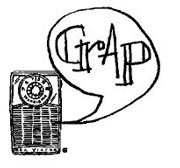I started writing about politics for a living only rather recently. Beforehand, my life took a lot of odd turns. One of them is coming to Seattle for a visit next month: the National Association of Broadcasters (NAB).
It might seem odd given my political rantings, but my background is largely in business. Before writing, I worked as a community activist; but before that (and a debilitating illness), I spent 15 years in broadcasting, much of it running a company I started part time in 1984 while (as a 24-year-old) teaching at a medical school in Galveston. (Really.)
I lived on Market Street; the company became M Street. It sells radio industry research and trade publications. (For the morbidly curious, it’s at www.mstreet. net.) I’d spent years bouncing around a number of commercial and noncommercial stations (as radio folk do), and with M Street, a staple was the reunions: the bi-annual NAB conventions—one radio,one radio-TV.
The radio convention, with 10,000-plus owners, management, and the folks that sell to them, lands in Seattle Sept. 12-14. While my ex-colleagues hang out inside the Convention Center, a lot of my current alternative media colleagues will be both protesting and having their own convention outside.
In the decade since I left M Street, radio has changed—a lot. The Telecommunications Act of 1996 accelerated an already-existing trend of media consolidation and delocalization; new technologies, especially satellite-delivered formats and stations, fueled the trend. When I got my first radio job in 1976, you could only own two stations—one AM, one FM. Today, the largest company, Clear Channel Communications, owns about 15 percent of America’s radio stations—well over 1,000, including five in the Seattle area. While M Street Corp. doesn’t publicize it, a chunk of my old company is also now owned by Clear Channel. The CEO who made it into the continent’s biggest broadcaster, a guy named Randy Michaels, was a fan of M Street when he was a program director at WLW in Cincinnati. Later, he bought in; even at that level, personal connections count.
What Randy and a handful of heads of other broadcast giants like Entercom (eight stations in Seattle), Infinity, Viacom, et al., have done to radio is in many respects a crime. Radio, like most other forms of media in the U.S. today, is no longer local. Stations in Seattle sound exactly like stations in Phoenix or Atlanta or Detroit. In many cases (Howard Stern, Art Bell, Rush Limbaugh), they’re even the same shows. Local music is out. Local news is mostly forgotten, a victim of deregulation and the end of public service requirements. News costs money. Music makes money, and as we’re learning from the current neo-payola stink, the choice of which songs get played often has little to do with either merit or popularity.
Old-line broadcast owners like the Bullitts, who cared about their community and gave back to it, simply no longer exist. Companies like Clear Channel and Entercom swap stations and markets like so many baseball cards, gathering clusters of stations so as to dominate a market’s advertising dollars.
Seattle is lucky. Five whole companies own its biggest stations. Spokane has only two, with one company gathering 75 percent of listenership. Most smaller cities now have only one owner controlling all their radio. The result is both political and cultural hegemony, a sameness both in what we dance to and what we know about our neighbors.
Ever wonder why commercial radio music sucks? Why all morning shows are vacuous, innuendo-laden crap, or why all talk shows seem to veer right-wing, even when the city (like Seattle) doesn’t? It comes from corporate imperatives, lack of competition, and a herd mentality among the competition that remains. The herd will be grazing en masse in Seattle next month, and that’s why folks will protest.
Outside the Convention Center, alternative media activists—the worlds of Indymedia and community newspapers and cable access TV and all the other fringes of our media landscape—will meet, trade ideas and strategies, and rail at the laws and practices that have allowed the vitality of an essential part of our democracy to be strangled to death by corporate greed. Companies like Clear Channel are immensely profitable, but in every other Western democracy, media is not treated like soda pop or camping gear—simply one more market niche to make money from. It’s considered the mechanism for enabling us to become the informed citizens who run our democracy. It’s different.
When only one largely corporate-driven viewpoint informs us, our democracy suffers. Every other country knows it. When the NAB comes to town next month, the only folks who will even be thinking in such terms will be on the outside, looking in. Inside, the warped remains of my past will be on display.








